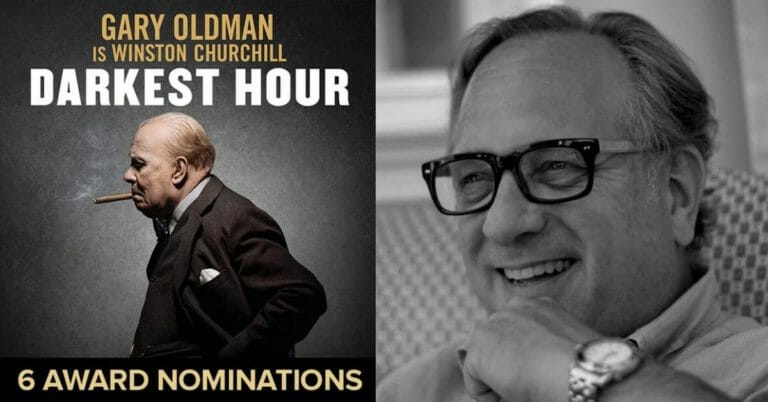By Martin Keady · April 9, 2020

Doug Urbanski is a film producer (and sometimes actor), known for his films DARKEST HOUR, NIL BY MOUTH, TINKER TAILOR SOLDIER SPY, and many other films, often working alongside his business and producing partner, Gary Oldman. He is currently producing MANK, David Fincher’s forthcoming movie about legendary screenwriter of CITIZEN KANE, Herman J. Mankiewicz, which will star Gary Oldman.
Here’s my exclusive interview with Doug Urbanski for The Script Lab where he offers five lessons for filmmakers, acquired through his experience producing (and even acting in) some of the finest films of the last quarter-century:
The film [Nil By Mouth] deals with the cycle of addiction in the UK, a trapped working class whose plight of addiction and abuse seems to continue no matter the decade, no matter which political party is in power. As an American with deep roots and dear friends in the UK, the thing that always struck me is the reality that the UK tries so hard to be a class-immobile society. There are always signs that this is changing, but very, very slowly. If you watch the film now, you will see that it remains as timeless and relevant as ever, and at the same time is a frozen moment, accurately portrayed. We have developed the idea further into a long-form series, and we shall see if anyone wants it!
David Fincher, who is a close friend, called me one day in 2008 and asked if I would play Larry Summers in his upcoming Facebook movie. It was that simple. I had never heard of Facebook at that moment. I said yes before I read it. Once I actually read it, I knew it fell within the confines of my limited actor wheelhouse, although I should say, in full disclosure, that prior to becoming a producer, I had been a professionally trained actor. The two full days I shot were amongst the most fun in my life! I came to think that every producer, every agent, and every manager should be required to act in a film for two days. They would never again not understand the genuine concerns, interests, and anxieties of being an on-camera performer.
I think I had seen the Alec Guinness TV version about 20 times. I knew him—he had appeared in a play for our company. The wonderful television version was very much a product of its time. Our film would be a product of our time and we were conscious of adopting a different approach. Moreover, the TV version was five or six hours long, and we had to address the whole book in two hours! This meant a tremendous amount of things one loves from the book would not be in our film. However, the magic of the superb screenplay and Gary Oldman’s dazzling performance are as good as it gets.
Gary Oldman resolutely said, and meant it, that he would NEVER play Churchill. I actually put all things possible in place a full year prior to his changing his mind. The casting of Churchill presented a problem for anyone trying to cast the role. Many actors had played the great man, and, more often than not, most were miscast. So I would play a little game with myself—putting on my casting director hat, asking myself how to cast Churchill. To this, there was only one answer: get the BEST actor. Not the fattest, not the oldest, but the best. That meant that the ONLY actor who could play the man was Gary Oldman. The film was nominated for every major award; Gary Oldman WON every major award.
There is not very much I can say about this film at the moment—we are done shooting and I have seen the film in the current cut, which is very close to being final. Once again, an incoming script from David Fincher. I read it twice that night and thought it was one of the best scripts I had ever, ever read. I was beyond smitten. Fincher is one of the most significant film-makers in film history. The fine people at Netflix would allow the production complete freedom. David had been wanting to make this script for decades, and at last, a number of perfect stars aligned in the Film-making Heavens for all of us. I got to pinch myself every day going to work—surrounded by Fincher, Oldman, and Eric Roth, who was also producing and writing any re-writes (of the original script by Fincher’s father, Jack); pretty good.
P.S. As practical production matters, I learned two critical lessons early on:
1) Shoot first and ask questions later;
2) And never make the mistake of doing “too little, too late.”
 Martin Keady is an award-winning scriptwriter whose work has been produced for film, television, stage and radio. His major credits include: The Final, a short film about the famous ending of the 1979 FA Cup Final, which was shown on Channel Four; Moon the Loon, a play about the legendary Who drummer, Keith Moon, which was premiered at The Edinburgh Festival; and a collection of love poetry, Shards, extracts from which have been broadcast on Radio Four.” http://theshakespeareplays.com/
Martin Keady is an award-winning scriptwriter whose work has been produced for film, television, stage and radio. His major credits include: The Final, a short film about the famous ending of the 1979 FA Cup Final, which was shown on Channel Four; Moon the Loon, a play about the legendary Who drummer, Keith Moon, which was premiered at The Edinburgh Festival; and a collection of love poetry, Shards, extracts from which have been broadcast on Radio Four.” http://theshakespeareplays.com/
For all the latest from The Script Lab, be sure to follow us on Twitter, Facebook, and Instagram.